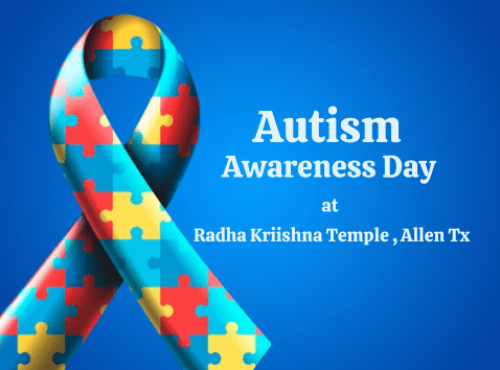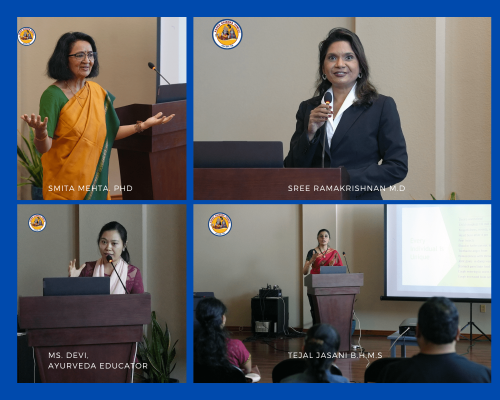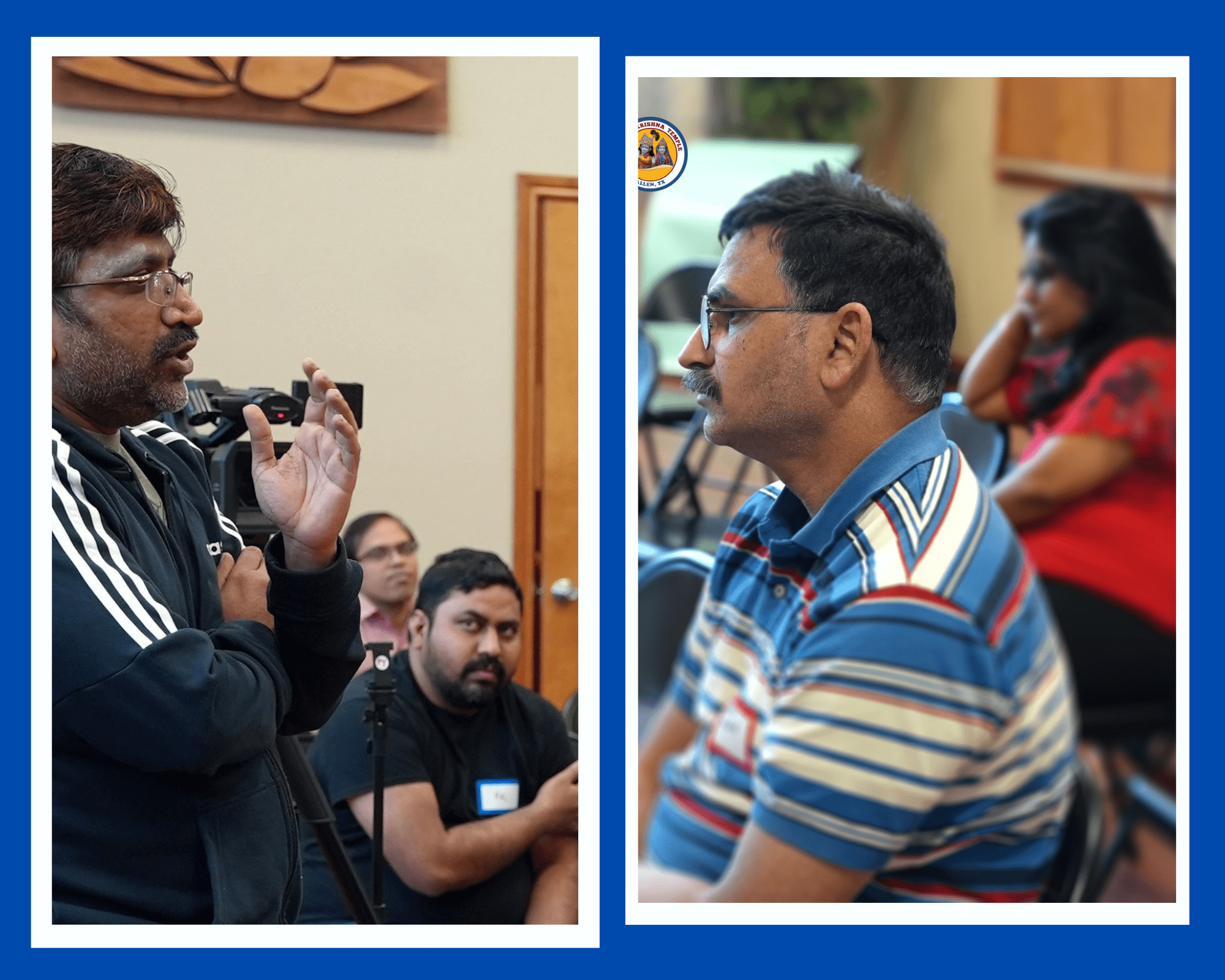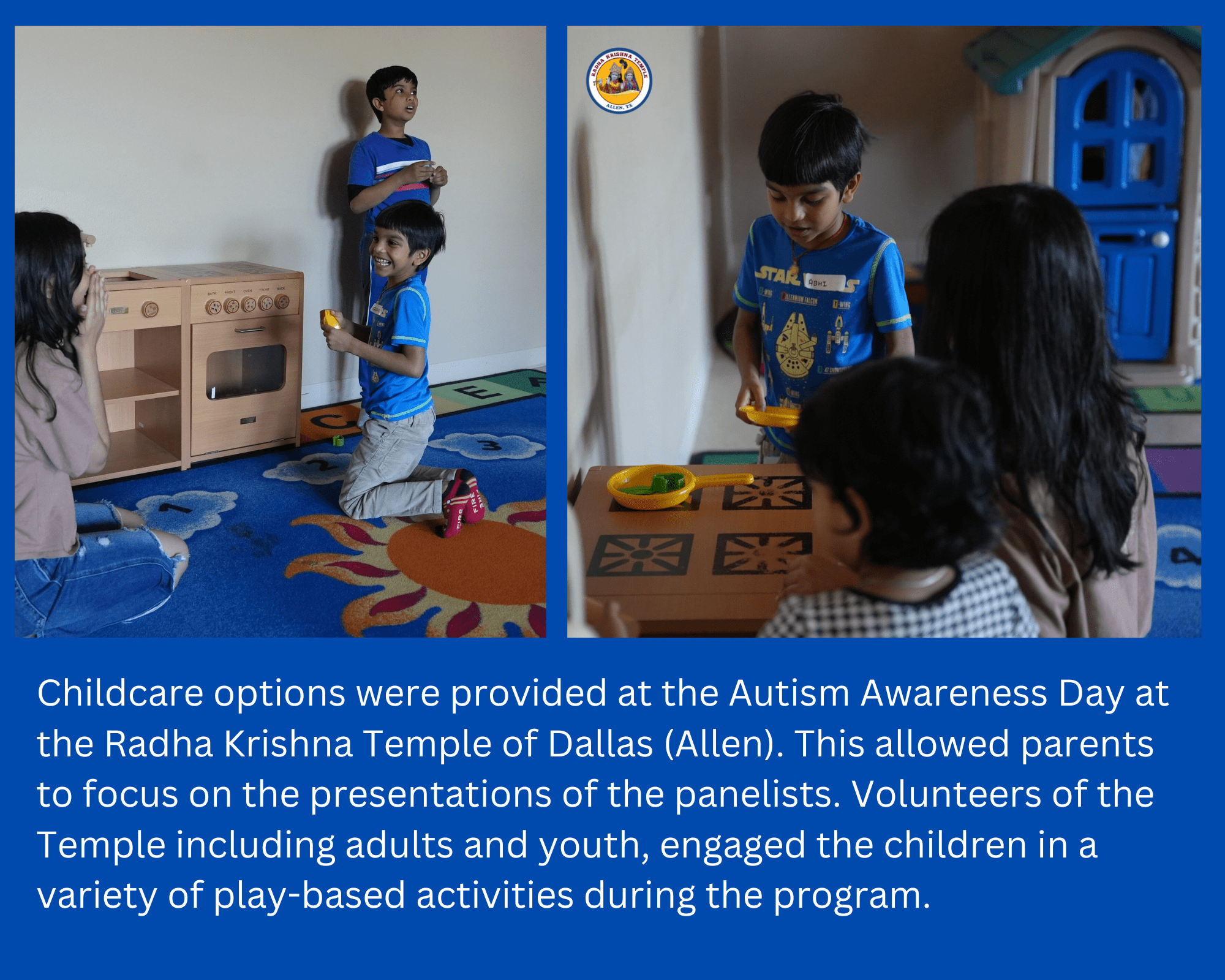
Autism Awareness Day at Radha Krishna Temple of Dallas: Options for Education, Care, and Remediation
Autism Awareness: What is Autism Spectrum Disorder?
It is a neurodevelopmental disorder characterized by challenges in receptive and expressive communication, social interaction with others, and patterns of behavior and interests that are restricted and repetitive in nature.
The symptoms of autism are typically recognized between 12-24 months of age, but in severe cases, they may be identified prior to 12 months. Autism is referred to as a spectrum disorder due to the very wide range of overt symptoms, ranging from mild (Level 1 – Requiring Support) to moderate (Level 2 – Substantial Support) and severe (Level 3 - Requiring Very Support). The level of severity determines the likelihood of independent functioning throughout the lifespan.
Autism Awareness: Prevalence Rate
According to the Centers for Disease Control & Prevention (CDC), the prevalence rate o autism has been steadily increasing over the decades. Their data from surveillance year 2000 to 2022, showed a dramatically increasing trend from 1:150 children in 2000, to 1:36 in 2022. While the pattern of growth is consistent across all ethnic groups, in the last decade, there has been an increase in the prevalence rate amongst non-White groups as well.
Autism Awareness: Diagnostic Characteristics of Autism Spectrum Disorder
A. Persistent deficits in social communication and social interaction across multiple contexts, as manifested by the following, currently or by history:
- Deficits in social-emotional reciprocity, ranging, for example, from abnormal social approach and failure of normal back-and-forth conversation; to reduced sharing of interests, emotions, or affect; to failure to initiate or respond to social interactions.
- Deficits in nonverbal communicative behaviors used for social interaction, ranging, for example, from poorly integrated verbal and nonverbal communication; to abnormalities in eye contact and body language or deficits in understanding and use of gestures; to a total lack of facial expressions and nonverbal communication.
- Deficits in developing, maintaining, and understanding relationships, ranging, for example, from difficulties adjusting behavior to suit various social contexts; to difficulties in sharing imaginative play or in making friends; to absence of interest in peers.
Specify current severity: Severity is based on social communication impairments and restricted, repetitive patterns of behavior (see Table below).
B. Restricted, repetitive patterns of behavior, interests, or activities, as manifested by at least two of the following, currently or by history:
- Stereotyped or repetitive motor movements, use of objects, or speech (e.g., simple motor stereotypes, lining up toys or flipping objects, echolalia, idiosyncratic phrases).
- Insistence on sameness, inflexible adherence to routines, or ritualized patterns of verbal or nonverbal behavior (e.g., extreme distress at small changes, difficulties with transitions, rigid thinking patterns, greeting rituals, need to take the same route, or eating the same food every day).
- Highly restricted, fixated interests that are abnormal in intensity or focus (e.g., strong attachment to or preoccupation with unusual objects, excessively circumscribed or perseverative interests).
- Hyper- or hyporeactivity to sensory input or unusual interest in sensory aspects of the environment (e.g., apparent indifference to pain/temperature, adverse response to specific sounds or textures, excessive smelling or touching of objects, visual fascination with lights or movement).
C. Symptoms must be present in the early developmental period (but may not become fully manifest until social demands exceed limited capacities or may be masked by learned strategies in later life).
D. Symptoms cause clinically significant impairment in social, occupational, or other important areas of current functioning.
E. These disturbances are not better explained by intellectual disability (intellectual developmental disorder) or global developmental delay. Intellectual disability and autism spectrum disorder frequently co-occur; to make comorbid diagnoses of autism spectrum disorder and intellectual disability, social communication should be below that expected for the general developmental level.
| Severity | Social Communication | Restricted, Repetitive Behaviors |
|---|---|---|
| 3 - Very substantial support | Severe challenges in verbal and nonverbal social communication skills; behavior challenges (absence of communication) | Great distress/difficulty changing focus or action |
| 2 - Substantial support | Marked challenges in verbal and nonverbal social communication skills; social difficulties apparent even with supports | Distress and/or difficulty changing focus or action |
| 1 – Requiring support | Without needed support, difficulties in social communication are very noticeable |
Difficulty with organization and planning affects independence |
World Autism Awareness Day & Month
Awareness of the early symptoms, diagnostic tools, and intervention or treatment options is critical for early intervention and remediation.
The United Nations declared April 2nd as World Autism Awareness Day, but the programs to raise awareness can be conducted throughout the month and year. The 2023 theme for World Autism Awareness is “Transforming the Narrative: Contributions at Home, at Work, in the Arts, and in Policymaking.” The purpose of this theme was to encourage families of individuals with autism to focus on accepting, supporting, and advocating, rather than expending energy to search for a cure.
Autism Awareness Day at Radha Krishna Temple of Dallas
Many families in our own neighborhood and community have children or family members with an Autism Spectrum Disorder. We can all support each other by offering information that they might find valuable. Keeping this theme in mind, the Radha Krishna Temple of Dallas (Allen) organized an Autism Awareness Day for the first time on its premises, with the goal of supporting our community members who have children or youth on the autism spectrum. It was held on April 29, 2023, from 4:00 to 6:00 PM. The Temple’s theme was Transforming the Narrative: Support and Advocacy. The purpose of this theme was to enable families to find and utilize sources of support for education, training, advocacy, and related activities.
The Radha Krishna Temple took the first step toward this goal to: (1) understand the needs of the local community, and (2) plan multiple events throughout the year to lend support in ways that may be beneficial for the Temple community. With this in mind, it organized a Panel Discussion with experts to provide an opportunity for parents to become aware of the options for education, care, and remediation.
Autism Awareness Day: Speakers & Topics

- Sree Ramakrishnan, M.D. – Top Ten Things All Parents Should Know About Autism
- Dr. Sree Ramakrishnan is a highly accomplished physician with over 15 years of experience in the field of pediatrics. She has a proven track record of integrating evidence-based diet, nutrition, and mind-body techniques in the treatment of childhood illness. Dr. Sree is passionate about creating and inspiring future leaders and clinical providers in Integrative Pediatric Care.
- Her presentation provided valuable information on the truly top ten things that all parents of children with autism should know.
- Tejal Jasani, B.H.M.S. – Role of Homeopathy in Autism
- Dr. Tejal Jasani is a Holistic Homeopathic practitioner in Dallas, Texas. She provides the best benefits of Classical Homeopathic care for chronic and recurring diseases/ailments to all in-person/virtual cases all over the USA.
- The presentation provided valuable insight in bringing about tremendous changes in sensory, behavioral, and even cognitive aspects to a certain extent. Homeopathy plays a significant role in building the immunity of the child.
- Smita Mehta, Ph.D. – Evidence-Based Interventions for Social, Communication and Behavioral Skills
- Dr. Smita Mehta was a Professor in Educational Psychology until recently. She coordinated the graduate program in Autism Intervention. Her research and teaching focused on behavioral and social-communication interventions for individuals with autism, parent training, and educator preparation.
- The purpose of this presentation was to increase awareness of the diagnostic characteristics and evidence-based interventions in behavior and social-communication skills of individuals with autism. Participants will leave with the knowledge of how to measure changes in learning and behavior as a function of intervention.
- Ms. Devi, Certified Educator of Ayurveda – Benefits of Yoga for Individuals with Autism
- Devi was born and raised in Myanmar. She started teaching yoga and meditation in 2009. She further studied kinesiology, health, fitness and various wellness courses. She is an E-RYT 500 Prem Yoga lead teacher and she completed Ayurveda educator program in 2017.
- The presentation offered a gentle approach to reducing symptoms through Yoga and Ayurveda. Autism disorder affects the nervous system. Yoga & Ayurveda practices which are well known to help calm the nervous system can result in better communication, retention, learning, and more independence.
Participants had the opportunity to connect with the presenters and engage in a Q&A session during and after the presentations. The presenters appreciate the challenges that parents of children with autism experience and are willing to provide support services in the form of a support group at the Temple.

Children engaged in play activities with volunteers during that time, allowing parents to focus on the day’s program. Adults and youth who are current devotees at the Radha Krishna Temple served as volunteers in the sentiment of service. Parents can use the Discussion board on this blog page to communicate their interest in future programs.

Autism Awareness General Resources
- Autism Speaks
- Evidence-Based Practices in Autism
- Autism Society
- OCALI
- Interagency Autism Coordinating Committee (IACC)
- CDC
#AutismAwarenessDay #AutismSpectrumDisorder #AutismCharacteristics #ASDPrevalenceRate #JKYog #RadhaKrishnaTempleOfDallas #SwamiMukundananda


